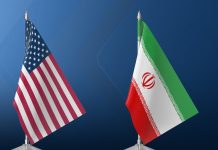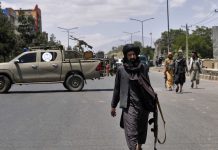MOSCOW: Russian President Vladimir Putin has discussed the situation in Kazakhstan in several phone calls with his Kazakh counterpart Kassym-Jomart Tokayev, Russian news agencies cited the Kremlin as saying.
Putin also spoke to leaders of other countries in the Collective Security Treaty Organization (CSTO) military alliance on Thursday and Friday, agencies quoted Kremlin spokesperson Dmitry Peskov as saying.
Russian leader had “conversations with President of Kyrgyzstan Sadyr Zhaparov, President of Belarus Alexander Lukashenko, President of Tajikistan Emomali Rahmon, as well as with the Prime Minister of Armenia,” the Kremlin spokesperson said.
“They discussed the situation in Kazakhstan and joint actions within the framework of the CSTO mandate to combat international terrorism and to ensure order, as well as the security of citizens of Kazakhstan,” Peskov said.
According to him, since the beginning of the operation of the collective peacekeeping forces, Defense Minister Sergei Shoigu has been constantly reporting to Putin on the progress of the transfer of the military troops to Kazakhstan and the fulfillment of the assigned tasks.
Security forces appeared to have reclaimed the streets of Kazakhstan’s main city on Friday after days of violence, and Kazakh president said he had ordered his troops to shoot-to-kill to put down a countrywide uprising.
Earlier, Moscow said more than 70 planes were ferrying Russian troops into Kazakhstan, and that these were now helping control Almaty’s main airport, recaptured on Thursday from protesters.
Demonstrations that began as a response to a fuel price hike have swelled into a broad movement against the government and ex-leader Nursultan Nazarbayev, 81, the longest-serving ruler of any former Soviet state. He turned over the presidency to Tokayev three years ago but his family is widely believed to have retained influence in Nur-Sultan, the purpose-built capital that bears his name.
The protesters in Almaty appear mainly to come from the city’s poor outskirts or surrounding towns and villages. The violence has come as a shock to urban Kazakhs.
“At night when we hear explosions, I am scared,” a woman named Kuralai told Reuters. “It hurts to know that young people are dying. This has clearly been planned … probably our government has relaxed somewhat.”
In a state where scant political opposition is tolerated, no high-profile leaders of the protest movement have emerged to issue any formal demands.
One man who attended the first night of demonstrations and did not want to be identified said most of those who initially turned up were there to “express solidarity spontaneously,” before 100-200 “aggressive youths” started hurling rocks at police. He said he had expected some opposition politicians to formulate demands, but in vain. -Agencies




